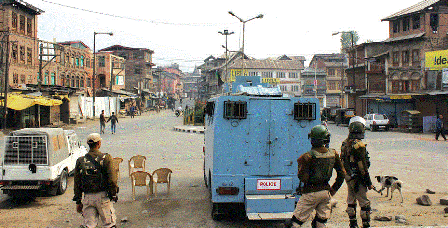Kashmir Not Enthused, Curfew And Shutdown Marks PM Modi's Visit
Barbed wires, and deserted streets marked Prime Minister Narendra Modi's visit to Kashmir Valley

NEW DELHI: Curfew with paramilitary in full gear on the roads, barbed wires, and deserted streets marked Prime Minister Narendra Modi’s visit to Kashmir Valley on Diwali. Far from enthused the people stayed indoors while a few sanitised for the visit by the local BJP unit braved the frisking to meet the Prime Minister, or at least try to, and share their trauma and suffering during and after the floods.
This is PM Modi’s fourth visit to the state, and came after a flying visit to Siachen to meet the Indian soldiers and send a distinct message to Pakistan that there would be no compromise on this issue, (See The Citizen South Asia page). His stopover in Srinagar after this was a non event with Chief Minister Omar Abdullah boycotting a meeting at the Governors House, and the social media flooded with messages from ordinary Kashmiris asking why the PM had not remembered them on Eid. More so as Eid had come when parts of the state was still under flood waters, and the suffering and anxiety intense.
On the plus side, however, the PM was able to underscore his interest in the reconstruction of Jammu and Kashmir pledging an additional Rs 745 crores and promising to do what it takes to get the state back on its feet. He said that the state government’s demands--of Rs 44,000 crores-- were being looked at, and more money was possibly on its way.
Underneath the concern is of course the BJP’s serious interest in holding the elections in the state, despite opposition from within. The National Conference is completely on the backfoot with the Chief Minister’s apathetic response to the recent disaster painting him and his party out of the electoral picture altogether. The Congress party that strongly opposed the Prime Ministers visit as an “election gimmick” is in the doldrums as well but remains optimistic---as it was in Haryana and Maharashtra---of improving over its Lok Sabha performance where it did not get a single seat in the state.
The Peoples Democratic Party has a tacit understanding with the BJP with the Muftis reluctant to join horns with it on any issue. PDP leaders were in full attendance during PM Modi’s visit in the state although unconfirmed reports from the Valley suggest differences that might have a serious impact on the party in the short term. PDP leaders, however, took the opportunity to attack the NC government informing the Prime Minister of the slow pace of work, and the visible disinterest. They claimed that the CM had not been interested at all in the relief and rehabilitation work, and there was raging discontent against him and his government in the state.
Kashmir remained closed for the PMs visit. All shops were shut, partly because of the curfew and strict security arrangements but more in response to a hartal call by the separatist leaders. Separatist leaders all issued statements questioning the PM’s visit with Hurriyat leader Syed Ali Shah Geelani saying that it amounted to “rubbing salt on our wounds”; and Jammu and Kashmir Liberation Front chief Yasin Malik insisting that it was an effort to politicise a human tragedy.Ordinary Kashmiris on the social media remained very critical of the visit, with most describing it as a gimmick for the elections.
PM Modi’s visit did not melt hearts, but as a person who had met him told The Citizen, “it was probably not even intended for that.” Many in Srinagar were of the view that the Prime Minister was using the platform of Kashmir to send a message “ it is ours” to Pakistan but at the same time communicate his apparent concern to the global community that retains an interest in the sensitive border state. This along with preparations for Assembly elections seems to sum up the Prime Ministers agenda for this visit, with the BJP hoping to gain seats not just in Jammu and Ladakh but in the Valley as well.



